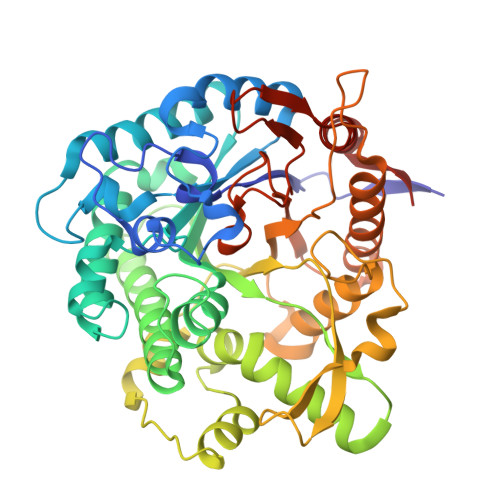Rational design facilitates the improvement of glucose tolerance and catalytic properties of a beta-glucosidase from Acetivibrio thermocellus.
Kamale, C., Rauniyar, A., Bhaumik, P.(2025) FEBS J 292: 1174-1196
- PubMed: 39764622
- DOI: https://doi.org/10.1111/febs.17394
- Primary Citation of Related Structures:
9IQB - PubMed Abstract:
Cellulases are an ensemble of enzymes that hydrolyze cellulose chains into fermentable glucose and hence are widely used in bioethanol production. The last enzyme of the cellulose degradation pathway, ¦Â-glucosidase, is inhibited by its product, glucose. The product inhibition by glucose hinders cellulose hydrolysis limiting the saccharification during bioethanol production. Thus, engineered ¦Â-glucosidases with enhanced glucose tolerance and catalytic efficiency are essential. This study focuses on the rational engineering of ¦Â-glucosidase from Acetivibrio thermocellus (WT-AtGH1). Recombinant WT-AtGH1 exhibited activity on cellobiose and p-nitrophenyl-¦Â-d-glucoside as substrates and retained around 80% of its activity over 48?h at 55?¡ãC, pH 5.5. However, WT-AtGH1 showed low glucose tolerance of 380?mm as compared to the required IC 50 value of >?800?mm for industrial use. Thus, a rational design approach was utilized to enhance the glucose tolerance of this enzyme. We determined the 3?? resolution crystal structure of WT-AtGH1. The structure-based engineered G168W-AtGH1 and S242W-AtGH1 mutants exhibited improved glucose tolerance of 840 and 612?mm, respectively. Surprisingly, S242L-AtGH1 mutant showed ~?2.5-fold increase in the catalytic efficiency as compared to WT-AtGH1. A combinatorial effect of improved glucose tolerance, as well as enhanced catalytic efficiency, was observed for the G168W-S242L-AtGH1 mutant. All the mutants with enhanced properties showed considerable stability at industrial operating conditions of 55?¡ãC and pH 5.5. Thus, we present mutants of WT-AtGH1 with improved glucose tolerance and kinetic properties that have the potential to increase the efficiency of saccharification during biofuel production.
Organizational Affiliation:
Department of Biosciences and Bioengineering, IIT Bombay, Mumbai, India.















